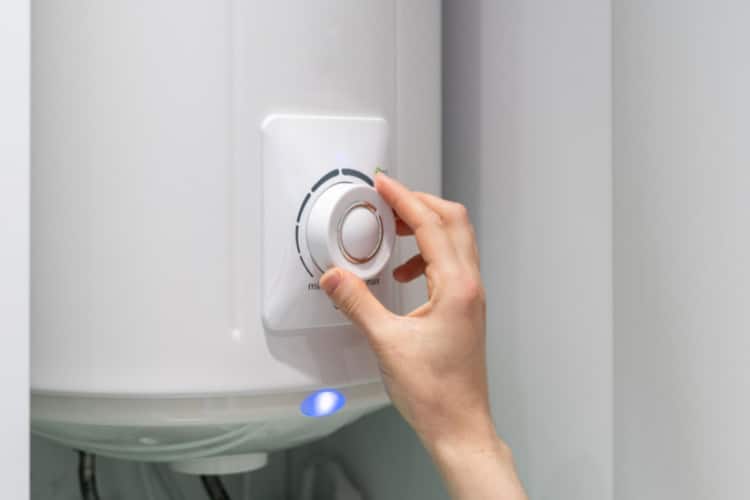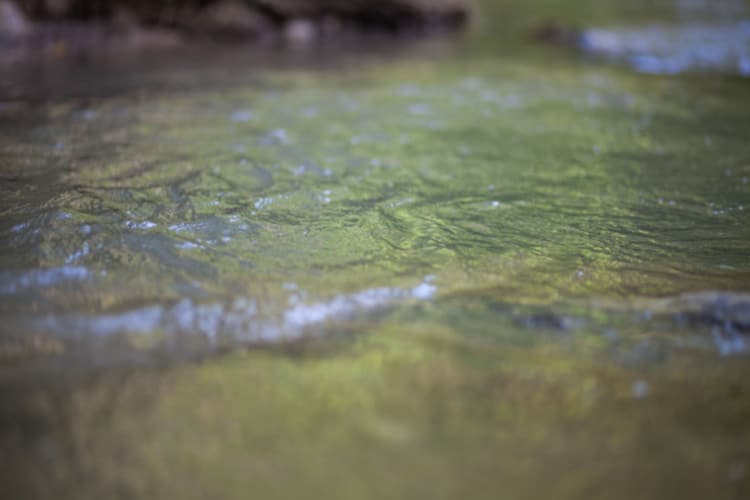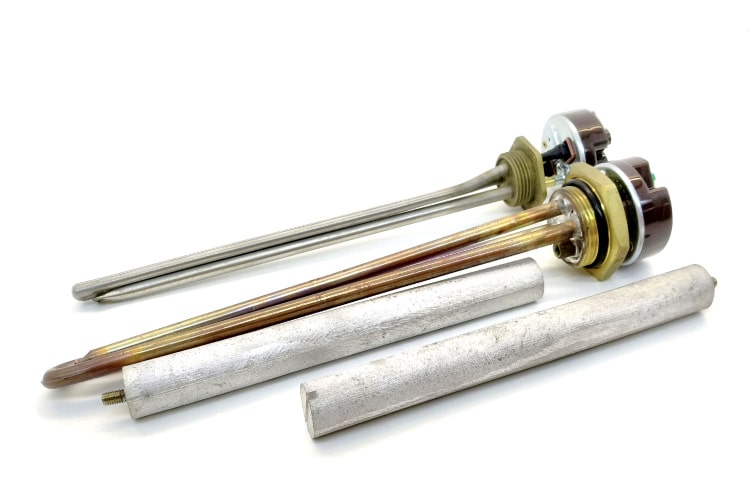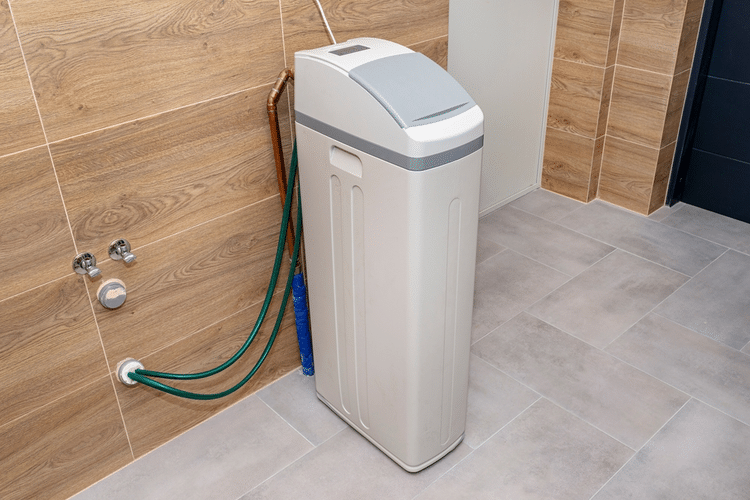If your hot water smells like rotten eggs, hydrogen sulfide is likely culprit. It is commonly known as an hazardous gas that, if present in your water heater, can cause the water to smell like sulfur.
Here’s a tabular view of different ways hydrogen sulfide can manifest in your water heater:
| Hydrogen Sulfide Source | Solution |
|---|---|
| Leftover warm water in your water heater | Frequently discharge leftover hot water in tank. Always make sure the tank is empty |
| Sulfur-reducing bacteria (SRB) in your water heater tank | Apply a concentrated chlorine treatment to your tank, flush the tank or completely replace your water heater |
| Contaminated water source (mostly well water) | Get a Sulfur Water Filter (Our recommendation: Springwell Sulfur Filter) Get a chemical injection system (Our recommendation: Springwell Injection System) Get an Hydrogen Peroxide System: (Our Recommendation: US Matrixx System) |
| Magnesium Anode rods reacting with sulfides in water | Replace magnesium rod with aluminium or zinc rod |
| Sulfur-reducing bacteria (SRB) in your water softener tank | Clean/Flush your water softener tank, Also consider installing a water filter. |
Why Does My Hot Water Smell Like Sulfur?
The main culprit, hydrogen sulfide, is known to leak from faucets and fixtures, causing a terrible, rotten eggs smell. It can also sometimes cause discoloration, leaving unsightly greasy black or yellow stains on your faucets and appliances.
Hydrogen sulfide can originate from several different sources. Its source can be your water heater’s tank or something further down the line, such as the building’s infrastructure or the city’s water plant.
The gas itself is not life-threatening, as the amount in your pipes is probably negligible and unlikely to cause serious health issues. However, it can lead to a slew of potential health problems such as eye irritation, dizziness, and digestive upsets.
The good news is that the human nose is able to detect even low levels of hydrogen sulfide. If the water has dangerously high levels of hydrogen sulfide, it’d be so pungent that you wouldn’t even be able to consider drinking it or bathing with it.
Here are some of the most frequent things that can exacerbate the problem and tips to get rid of the smell.
1. There’s Leftover Warm Water in Your Water Heater Tank
Your water heater’s tank is the first place to check for rotten eggs smell. If by chance you have leftover warm water in your heater’s tank, this might be the source of the smell. This is because stale hot water is a breeding ground for bacteria. In this case, simply discharging the leftover warm water might completely eliminate the smell.

Some of those bacteria can also be the notorious sulfur-reducing bacteria (SRB). SRB feeds off of small amounts of sulfur that are already present in the tank. The more it feeds off the sulfur, the more it reduces the ratio of elemental sulfur to hydrogen sulfide. This, in turn, creates a rotten egg smell.
The Solution:
The solution to removing rotten eggs smell caused by Sulfur-reducing bacteria (SRB) is relatively straightforward: Apply a concentrated chlorine treatment to your tank. Simply add chlorine to your tank and let it circulate through the pipes and tank.
Always be mindful when you are using chlorine. After applying it, you won’t be able to use the water heater for at least 24 hours, as chlorine has to completely evaporate from water before its safe for use. The chlorine treatment approach should be enough to eliminate the smell. However, there are instances where it simply won’t cut it.
Another thing you can try is to flush the tank, which can permanently eliminate the bad smell. The downside is that you might need to hire a professional to do the job.
Naturally, you’ll need to completely dismount the heater, so you’d want all the help you can get. If you hire a plumber, you can also ask them to clean the inside of the tank in order to remove the smell entirely.
If all else fails, your last resort is to replace the water heater. If you do end up replacing the water heater, and the smell still persists, that means that the problem isn’t in your water heater and you should look elsewhere for a fix.
2. Your Water Source is Contaminated
13%, or 42 million of the U.S. population, rely on private wells for their water supply. If you happen to be in this percentage and your water smells like rotten eggs, then your groundwater well might be infested with SRB.

If this happens to be the case, it’s probably due to low oxygen levels and warm environment. You can test if your well is contaminated by running cold water through your faucets for an extended period of time.
If the smell is still present, then it confirms a problem with your well and not the Water Heater. Unfortunately, there are no easy fixes when it comes to contaminated wells.
The first thing to try is throwing in some well cleansing tablets or solutions, such as the NuWell-100 Pelletized Well Cleaner. This probably won’t completely eliminate the problem, but it’s a good thing to try out before investing in a water treatment system.
Other treatment solutions for contaminated well:
Chlorination Systems: Chlorination systems work by injecting a small amount of chlorine into the water supply to effectively kill bacteria.
However, you’ll have to purchase a de-chlorinating carbon filter to remove the chlorine reminants and smell after the water has been disinfected. This is the only way of making your water safe for human consumption after chlorination.
Hydrogen Peroxide: Hydrogen peroxide filters are another effective method of removing sulfur. They’re also known to dilute and remove iron and manganese minerals.
Upon installation, the hydrogen peroxide pump will continuously imbue your water source with a rate of 25 parts per million (ppm) of H₂O₂ to remove the sulfur.
Combining the hydrogen peroxide-treated water with a carbon filter or water softener will effectively eliminate sulfur and other well water contaminants.
Backwashing Filter: Backwashing filter is another common way to remove hydrogen sulfide from water. These filters convert insoluble sulfur to soluble sulfur.
Backwashing water filters come in large tanks. They are able to clean and renew themselves by backwashing. During the backwashing process, the water flow is reversed so that it enters from the bottom of the filter bed.
That said, your water needs to be at a level of at least 8 pH for these filters to work effectively.
Aeration Systems: Aeration is another effective way to get rid of unpleasant odors coming from your well because they reduce the total amount of hydrogen sulfide in the water.
If you opt for this approach, make sure to consult with a professional plumber to assist you in choosing a system that will work best in your circumstances.
Keep in mind that you may need to completely replace your water heater even after installing a new water treatment system because the rotten egg smell might linger in your old heater.
3. Magnesium Anode Rods Reacting With Sulfides in Water
In most cases, gas and electric water heaters use anode rod. These rods absorb corrosion and protect the walls of the heater tank. However, in some cases, they can cause a reaction that creates buildup of hydrogen sulfide.

Anode rods are made of magnesium, zinc, or aluminum. Magnesium anode rods have significant benefits over zinc and aluminum. For one, they protect against corrosion more effectively and add small amounts of magnesium to your water supply, which makes drinking water more beneficial to your health.
Unfortunately, magnesium anode rods corrode and react with sulfates in your water supply. Typically, when this reaction occurs, you’ll notice an excess of air coming out from your faucets and fixtures, giving way to a rotten egg odor.
Luckily, fixing this problem is relatively easy. Just replace the magnesium anode rod with an aluminum or zinc rod, and you should be able to get rid of the unpleasant smell.
Aluminum and zinc rods are less expensive and last longer than magnesium rods, but they aren’t suited for outlets that provide drinking water. This is because aluminum rods can cause sediment buildup, leading to cloudy tap water.
Aluminum zinc rods are a non-toxic option with no health threat and does not react with the sulfates in your water supply. That being said, they do cause sediment build-ups and should be replaced more frequently.
4. Sulphate Reducing Bacteria in Water Softeners
If you have a water softener installed, you might want to check its tank for odors. Water softener tanks are notorious for sulfate-reducing bacteria buildup. SRB is attracted to the sodium found in water softener tanks, and once it’s there, the tank provides an ideal environment for SRB to populate.

The Solution:
The first thing to do is call a professional to clean your water softener tank. If your tank is still covered by its insurance policy, it’s a good idea to take advantage of that and schedule a tank cleaning. Either way, you want to clean the water softener tank at least once a year.
You can also install a water filter alongside your water softening system. The filter will remove sulfur and iron and reduce the SRB buildup in the water softener tank.
We recommend that you hire or consult with a professional when it comes to filter installations. They’ll be able to test your water supply and determine what type of filter works best.
Conclusion
If you’re experiencing rotten eggs smell from your water heater, your best bet is to immediately hire a professional experienced with hydrogen sulfide removal. This will save you time and money in the long run.
I never had this problem with my well water until I turned my water tank temperature from 140 degrees down to 120. I like the lower temperature but the higher temp kills the bacteria. All the business you hear on other sites about replacing your water heater is salami.
The article offers practical solutions to address this problem, such as flushing the water heater, disinfecting the system, or consulting a professional plumber if needed. It’s also helpful that the article emphasizes the importance of regular maintenance and testing water quality to ensure safe and odor-free hot water. Overall, this article provides clear explanations and actionable steps to help readers tackle the issue of a rotten eggs smell in their hot water heaters. Thank you for sharing this informative piece!